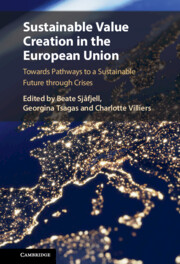 Sustainable Value Creation in the European Union
Sustainable Value Creation in the European Union Book contents
- Sustainable Value Creation in the European Union
- Sustainable Value Creation in the European Union
- Copyright page
- Dedication
- Epigraph
- Contents
- Figures
- Tables
- Contributors
- Foreword
- Preface
- Part I The Objectives of the EU’s Social Market Economy Revisited
- 1 Stimulating Value Creation in a Europe in Crisis
- 2 Ten Million or One Hundred Million Casualties? COVID-19 and Europe’s Sustainability Agenda
- 3 The Corporation and the EU Social Market Economy
- Part II The (UN)Sustainability of the EU Economic System
- Part III Ways Forward in the Promotion of Value Creation
- Part IV Thinking Ahead
- Index
2 - Ten Million or One Hundred Million Casualties? COVID-19 and Europe’s Sustainability Agenda
from Part I - The Objectives of the EU’s Social Market Economy Revisited
Published online by Cambridge University Press: 01 December 2022
- Sustainable Value Creation in the European Union
- Sustainable Value Creation in the European Union
- Copyright page
- Dedication
- Epigraph
- Contents
- Figures
- Tables
- Contributors
- Foreword
- Preface
- Part I The Objectives of the EU’s Social Market Economy Revisited
- 1 Stimulating Value Creation in a Europe in Crisis
- 2 Ten Million or One Hundred Million Casualties? COVID-19 and Europe’s Sustainability Agenda
- 3 The Corporation and the EU Social Market Economy
- Part II The (UN)Sustainability of the EU Economic System
- Part III Ways Forward in the Promotion of Value Creation
- Part IV Thinking Ahead
- Index
Summary
This chapter analyses the impact of the COVID-19 crisis on developing countries. While the overall number of direct casualties of the crisis may reach ten million or more, this chapter argues that the impact of the crisis on the Low and Middle Income Countries may be potentially far greater, owing to tragedies indirectly caused by the crisis, such as hunger and famine. We estimate that, if poorly managed, the COVID-19 crisis could take 100 million or more lives in developing countries. In order to reach this number, we have considered and collected the different ways in which COVID-19 may hit these countries. We further provide an overview on how COVID-19 is hindering the progress on the United Nations Sustainable Developments Goals (SDGs) and submit that it may even put the realisation of the SDGs at risk. Arguing that the measures taken by European countries so far are insufficient to mitigate the economic and social impact of the crisis, we propose policy measures to mitigate the most severe impacts of the crisis on developing countries.
- Type
- Chapter
- Information
- Sustainable Value Creation in the European UnionTowards Pathways to a Sustainable Future through Crises, pp. 26 - 57Publisher: Cambridge University PressPrint publication year: 2022


